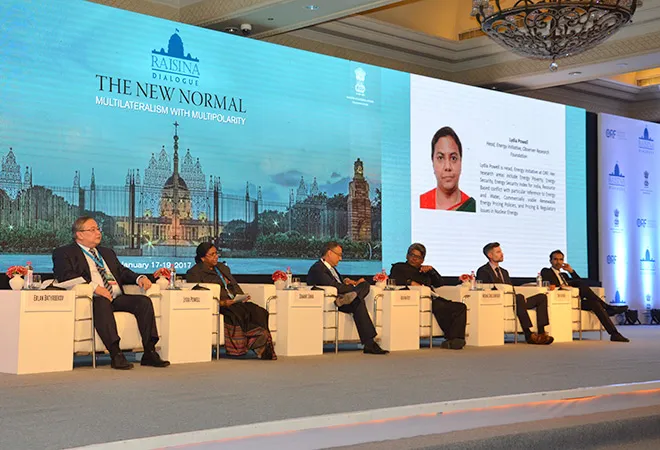
This essay appeared in Raisina 2017 Conference Report.
In late 2015, more than half the world came together to sign an agreement declaring that they would not allow global temperatures to rise by more than 1.5 degrees Celsius by 2100.
While the goal itself was modest, the agreement was hailed as a milestone in the fight against climate change. More than 140 countries submitted their Intended Nationally Determined Contributions, outlining specific actions designed to reduce carbon emissions over the next 50 years. India, too, used the opportunity to establish itself as a leader among emerging economies by setting ambitious goals, pledging to reduce the emissions intensity of its GDP by 33–35 percent by 2030. It also stated that that by 2030, 40 percent of the total installed power generation capacity in India would be from non-fossil fuel sources.
However, India and other emerging economies face a larger existential question when it comes to energy and development, panellists underlined during a discussion on “Will Energy Trump Climate?.”
Between 1950 and 2000, $847 trillion of wealth was created, largely through the use of surplus fossil fuels that have contributed to social, economic and technological progress of the world. Under the Paris Agreement, however, India and its fellow emerging economies are expected to develop without the use of cheap forms of energy that were available for industrial catalysation of developed nations. Thus, expecting emerging economies to use expensive forms of clean energy is untenable.
Having said that, recent developments have provided some good news for the fight against climate change. Participating in the panel, CEO of ReNew Power, Sumant Sinha, pointed out that the energy debate no longer needs to be framed in the context of development versus climate conservation. Courtesy recent technological advances, renewable energy is quickly becoming the cheapest form of energy available, but there are macroeconomic implications associated with the use of renewable energy.
The largest contribution — close to 70 percent — to India’s trade deficit comes from fossil fuel imports; the situation is mirrored across many non-oil producing countries of the world. Managing Director of Re-Define, Sony Kapoor, stated during the panel that this dependence on fossil fuels leaves countries at major macroeconomic risk due to the uncertainty associated with oil import prices.
Renewable energy, however, should not be looked at as a panacea for the ills of climate change. Environment policy expert Michael Schellenberger pointed out that solar and wind sources are intermittent, only producing energy 10–20 percent of the time.
Pointing towards Europe, Schellenberger shared that Germany increased its wind turbine capacity by 11 percent and solar capacity by 2.5 percent last year, but it only led to the generation of 1 percent and -1 percent of energy respectively, during the year.
Additionally, macroeconomic risk might be amplified rather that reduced due to a shift in renewable energy, according to Dr. Rathin Roy of the National Institute of Public Finance and Policy. Considering the Chinese monopoly of solar panel manufacturing — 75 to 80 percent of all solar panels are produced in China — the sources for future energy material might actually be less
diversified, leading to greater overall energy security risk if there is a large scale shift towards renewable energy.
Nuclear is much more expensive than renewables are right now, and so, to us, the natural path forward really would be in the dimension of renewable energy. — Sumant Sinha, Chairman and CEO, ReNew Power Ventures Pvt. Ltd, India
Schellenberger believes there are only two countries in the world that have scaled up low-carbon, pollution-free power at a pace to deal with climate change: France and Sweden. The impetus behind scaling up of clean energy has not been renewable energy but nuclear energy, which contributes to 75 percent of energy produced in France.
Nuclear energy does not face the intermittency issues associated with renewable energy; it produces negligible amounts of waste and does not have any energy security issue that are associated with fossil fuels and renewables, he pointed out.
It is, however, important to mention the massive downside associated with nuclear energy. The chances for large-scale disasterssuch as Chernobyl and Fukushima remain small, but their potential implications are tremendous. The calculated financial cost for the two nuclear incidents currently sits at $500 billion. This number does not take into account the massive cost of human lives and environmental damage the tragedies caused. There is also the issue of financial viability; nuclear power has not yet shown itself to be viable in any country without the help of implicit subsidies. Nuclear plants that have been built recently in the UK have, however, come close to being stranded assets due to the massive leap in solar technology, which has dramatically undercut the price of nuclear energy, leading to massive losses for nuclear power stalwarts such as Westinghouse.
We forget the difference fossil fuels has made to the livelihoods and quality of life. — Lydia Powell, Head, Energy Initiative, ORF
Moving home, India’s future energy usage remains complex and difficult to navigate. There is no single solution that will allow India to meet its developmental goals while reducing the carbon intensity of its economy. While there are hopes that future technological leaps will produce a battery and storage system that reduces intermittency of renewable energy, any current solution hinges on the right mix of renewable energy, nuclear energy and fossil fuels to propel the country into a new age.
The views expressed above belong to the author(s). ORF research and analyses now available on Telegram! Click here to access our curated content — blogs, longforms and interviews.




 PREV
PREV


